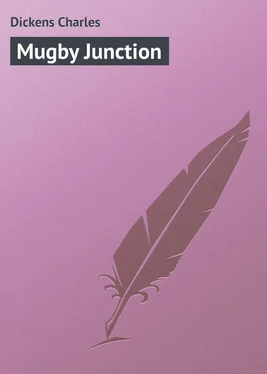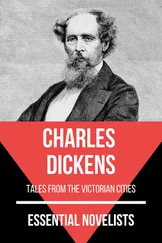Charles Dickens - Mugby Junction
Здесь есть возможность читать онлайн «Charles Dickens - Mugby Junction» — ознакомительный отрывок электронной книги совершенно бесплатно, а после прочтения отрывка купить полную версию. В некоторых случаях можно слушать аудио, скачать через торрент в формате fb2 и присутствует краткое содержание. Жанр: foreign_prose, на английском языке. Описание произведения, (предисловие) а так же отзывы посетителей доступны на портале библиотеки ЛибКат.
- Название:Mugby Junction
- Автор:
- Жанр:
- Год:неизвестен
- ISBN:нет данных
- Рейтинг книги:3 / 5. Голосов: 1
-
Избранное:Добавить в избранное
- Отзывы:
-
Ваша оценка:
- 60
- 1
- 2
- 3
- 4
- 5
Mugby Junction: краткое содержание, описание и аннотация
Предлагаем к чтению аннотацию, описание, краткое содержание или предисловие (зависит от того, что написал сам автор книги «Mugby Junction»). Если вы не нашли необходимую информацию о книге — напишите в комментариях, мы постараемся отыскать её.
Mugby Junction — читать онлайн ознакомительный отрывок
Ниже представлен текст книги, разбитый по страницам. Система сохранения места последней прочитанной страницы, позволяет с удобством читать онлайн бесплатно книгу «Mugby Junction», без необходимости каждый раз заново искать на чём Вы остановились. Поставьте закладку, и сможете в любой момент перейти на страницу, на которой закончили чтение.
Интервал:
Закладка:
“Everything is!” cried Lamps, radiantly. “Everything is music to her, sir.”
“My father is, at any rate,” said Phœbe, exultingly pointing her thin forefinger at him. “There is more music in my father than there is in a brass band.”
“I say! My dear! It’s very fillyillially done, you know; but you are flattering your father,” he protested, sparkling.
“No I am not, sir, I assure you. No I am not. If you could hear my father sing, you would know I am not. But you never will hear him sing, because he never sings to any one but me. However tired he is, he always sings to me when he comes home. When I lay here long ago, quite a poor little broken doll, he used to sing to me. More than that, he used to make songs, bringing in whatever little jokes we had between us. More than that, he often does so to this day. O! I’ll tell of you, father, as the gentleman has asked about you. He is a poet, sir.”
“I shouldn’t wish the gentleman, my dear,” observed Lamps, for the moment turning grave, “to carry away that opinion of your father, because it might look as if I was given to asking the stars in a molloncolly manner what they was up to. Which I wouldn’t at once waste the time, and take the liberty, my dear.”
“My father,” resumed Phœbe, amending her text, “is always on the bright side, and the good side. You told me just now, I had a happy disposition. How can I help it?”
“Well! but my dear,” returned Lamps argumentatively, “how can I help it? Put it to yourself, sir. Look at her. Always as you see her now. Always working – and after all, sir, for but a very few shillings a week – always contented, always lively, always interested in others, of all sorts. I said, this moment, she was always as you see her now. So she is, with a difference that comes to much the same. For, when it’s my Sunday off and the morning bells have done ringing, I hear the prayers and thanks read in the touchingest way, and I have the hymns sung to me – so soft, sir, that you couldn’t hear ’em out of this room – in notes that seem to me, I am sure, to come from Heaven and go back to it.”
It might have been merely through the association of these words with their sacredly quiet time, or it might have been through the larger association of the words with the Redeemer’s presence beside the bedridden; but here her dexterous fingers came to a stop on the lace-pillow, and clasped themselves round his neck as he bent down. There was great natural sensibility in both father and daughter, the visitor could easily see; but each made it, for the other’s sake, retiring, not demonstrative; and perfect cheerfulness, intuitive or acquired, was either the first or second nature of both. In a very few moments, Lamps was taking another rounder with his comical features beaming, while Phœbe’s laughing eyes (just a glistening speck or so upon their lashes) were again directed by turns to him, and to her work, and to Barbox Brothers.
“When my father, sir,” she said brightly, “tells you about my being interested in other people even though they know nothing about me – which, by-the-by, I told you myself – you ought to know how that comes about. That’s my father’s doing.”
“No, it isn’t!” he protested.
“Don’t you believe him, sir; yes, it is. He tells me of everything he sees down at his work. You would be surprised what a quantity he gets together for me every day. He looks into the carriages, and tells me how the ladies are drest – so that I know all the fashions! He looks into the carriages, and tells me what pairs of lovers he sees, and what new-married couples on their wedding trip – so that I know all about that! He collects chance newspapers and books – so that I have plenty to read! He tells me about the sick people who are travelling to try to get better – so that I know all about them! In short, as I began by saying, he tells me everything he sees and makes out, down at his work, and you can’t think what a quantity he does see and make out.”
“As to collecting newspapers and books, my dear,” said Lamps, “it’s clear I can have no merit in that, because they’re not my perquisites. You see, sir, it’s this way: A Guard, he’ll say to me, ‘Hallo, here you are, Lamps. I’ve saved this paper for your daughter. How is she agoing on?’ A Head-Porter, he’ll say to me, ‘Here! Catch hold, Lamps. Here’s a couple of wollumes for your daughter. Is she pretty much where she were?’ And that’s what makes it double welcome, you see. If she had a thousand pound in’ a box, they wouldn’t trouble themselves about her; but being what she is – that is, you understand,” Lamps added, somewhat hurriedly, “not having a thousand pound in a box – they take thought for her. And as concerning the young pairs, married and unmarried, it’s only natural I should bring home what little I can about them , seeing that there’s not a Couple of either sort in the neighbourhood that don’t come of their own accord to confide in Phœbe.”
She raised her eyes triumphantly to Barbox Brothers, as she said:
“Indeed, sir, that is true. If I could have got up and gone to church, I don’t know how often I should have been a bridesmaid. But if I could have done that, some girls in love might have been jealous of me, and as it is, no girl is jealous of me. And my pillow would not have been half as ready to put the piece of cake under, as I always find it,” she added, turning her face on it with a light sigh, and a smile at her father.
The arrival of a little girl, the biggest of the scholars, now led to an understanding on the part of Barbox Brothers, that she was the domestic of the cottage, and had come to take active measures in it, attended by a pail that might have extinguished her, and a broom three times her height. He therefore rose to take his leave, and took it; saying that if Phœbe had no objection, he would come again.
He had muttered that he would come “in the course of his walks.” The course of his walks must have been highly favourable to his return, for he returned after an interval of a single day.
“You thought you would never see me any more, I suppose?” he said to Phœbe as he touched her hand, and sat down by her couch.
“Why should I think so!” was her surprised rejoinder.
“I took it for granted you would mistrust me.”
“For granted, sir? Have you been so much mistrusted?”
“I think I am justified in answering yes. But I may have mistrusted too, on my part. No matter just now. We were speaking of the Junction last time. I have passed hours there since the day before yesterday.”
“Are you now the gentleman for Somewhere?” she asked with a smile.
“Certainly for Somewhere; but I don’t yet know Where. You would never guess what I am travelling from. Shall I tell you? I am travelling from my birthday.”
Her hands stopped in her work, and she looked at him with incredulous astonishment.
“Yes,” said Barbox Brothers, not quite easy in his chair, “from my birthday. I am, to myself, an unintelligible book with the earlier chapters all torn out, and thrown away. My childhood had no grace of childhood, my youth had no charm of youth, and what can be expected from such a lost beginning?” His eyes meeting hers as they were addressed intently to him, something seemed to stir within his breast, whispering: “Was this bed a place for the graces of childhood and the charms of youth to take to, kindly? O shame, shame!”
“It is a disease with me,” said Barbox Brothers, checking himself, and making as though he had a difficulty in swallowing something, “to go wrong about that. I don’t know how I came to speak of that. I hope it is because of an old misplaced confidence in one of your sex involving an old bitter treachery. I don’t know. I am all wrong together.”
Читать дальшеИнтервал:
Закладка:
Похожие книги на «Mugby Junction»
Представляем Вашему вниманию похожие книги на «Mugby Junction» списком для выбора. Мы отобрали схожую по названию и смыслу литературу в надежде предоставить читателям больше вариантов отыскать новые, интересные, ещё непрочитанные произведения.
Обсуждение, отзывы о книге «Mugby Junction» и просто собственные мнения читателей. Оставьте ваши комментарии, напишите, что Вы думаете о произведении, его смысле или главных героях. Укажите что конкретно понравилось, а что нет, и почему Вы так считаете.












